Text
Book of the Week: Rebirth of the Malicious Empress of Military Lineage
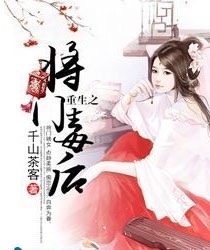
Author: Qian Shan Cha Ke (千山茶客)
Genre: ancient setting, josei
Rating: M (very mature, dark themes but not too graphic of depictions)
My Synopsis: What happens when a girl gets tired of being nice and decides to go apeshit? You get Shen Miao, our adorable 30+ year-old protagonist recently stuffed back into her 14-year-old self and ready to eat the flesh and drink the blood of her enemies! Using this new lease on life, she’ll methodically and maliciously ruin every antagonist’s life using the tools in her versatile skillset, including: knowledge of the future, a psychological understanding of assholes, weaponized gender stereotypes, and men. And lest we forget our love interest, Xie Jing Xing: the boy/man (cause god forbid the author know how old anyone BUT Shen Miao is…) who thought he had it all figured out until he discovered that Shen Miao is a horny drunk. See just how far they’ll go to bathe in the blood of their enemies while keeping their loved ones safe in this very long but extremely satisfying novel.
My Actual Review: It’s so satisfying to see a previously downtrodden character scheme her way into a happy ending, and Shen Miao fucking deserves it. Some reviews that I’ve seen have claimed that the LI eventually takes over her revenge schemes, but I didn’t see it. They just partner up and she uses his manpower to do what she wants. There are also places where their separate goals intersect, so it just makes more sense for him to do the cleanup. The thing about Shen Miao is that she has no issues with letting others do the work for her, especially if it’s against people she wasn’t invested in putting work against to begin with. It’s the empress in her, I fear. As for the main pair as a couple, I loved their every interaction, and their descent into romance felt natural and gratifying. Greatest thing about this romance is the fact that it truly kicks off because Xie Jing Xing did not know to guard against horny drunk Shen Miao lmao!
The translation is pretty good outside of some clunky grammar, but once you train your eyes to glaze over the the five-millionth time the translator inserts directly into the story to complain about how often the LI is described as hot (unlike every other character, I guess???) as if this book is their early 2000s fanfic, it gets even better! Another thing that may or may not be here nor there is that this author is really weird with age consistency. Like, “MC is forever un-aging while everyone else ages 2 years every few months” weird. Shen Miao is forever 14 until the time skip in which she is forever 16, while Xie Jing Xing goes from “the same age as the students” to “17/18ish” to “vaguely in his 20s” during the same course of time where we literally never see Shen Miao acknowledge a birthday in any year. As for more serious content warnings, this story involves underage relationships (including non-explicit sex, marriage, and pregnancy), rape as a weapon, (assumed) incest between cousins, child abuse, and described but not explicitly shown torture. Though there are some humorous parts, this is not a lighthearted story. Read if you want something dark with an ultimate happy ending.
Translation: complete
42 notes
·
View notes
Text
10 traditional characters that I didn't know existed

In 2023 I started learning to write traditional characters by hand, so I've been paying extra attention to differences between traditional and simplified forms. In some cases, I didn't even realize the traditional and simplified forms were different!
Here are 10 sets of simplified and traditional characters with subtle differences, 8 of which I only discovered recently. Definitions are adapted from MDBG.
(1)抛 | 拋 pāo
The difference is SO subtle with this one. I have to hold the screen 3 inches from my face to see it. The simplified version has 7 strokes, but the traditional version has 8.
抛 | 拋 pāo - to throw / to toss / to fling / to cast / to abandon
抛弃 | 拋棄 pāoqì - to abandon / to discard / to renounce / to dump (sb)
抛开 | 拋開 pāokāi - to throw out / to get rid of
抛物线 | 拋物線 pāowùxiàn - parabola
(2)滚 | 滾 gǔn
I actually prefer the traditional version, particularly when I'm writing by hand. When I write the simplified version, the 衣 strokes on the bottom always looks awkward under 公 to me.
滚 | 滾 gǔn - to boil / to roll / to take a hike / get lost!
摇滚 | 搖滾 yáogǔn - rock 'n' roll (music) / to rock / to fall off
滚开 | 滾開 gǔnkāi - to boil (of liquid) / boiling hot / Get out! / Go away!
滚烫 | 滾燙 gǔntàng - boiling / scalding
打滚 | 打滾 dǎgǔn - to roll about
(3)匀 | 勻 yún
I think these look pretty much the same when handwritten, but on the computer they are distinct. I definitely prefer how the simplified one looks.
匀 | 勻 yún - even / well-distributed / uniform / to distribute evenly / to share
均匀 | 均勻 jūnyún - even / well-distributed / homogeneous / well-proportioned (figure, body etc)
(4)叙 | 敘 xù
叙 | 敘 xù - to narrate / to chat
叙述 | 敘述 xùshù - to relate (a story or information) / to tell or talk about / to recount / narration / telling / narrative / account
叙事 | 敘事 xùshì - narrative
(5)奥 | 奧 ào
奥 | 奧 ào - obscure / mysterious
It really bugs me that 奥 has a different traditional form, but 澳 (as in 澳门 Macao) does not!
深奥 | 深奧 shēn'ào - profound / abstruse / recondite / profoundly
奥运会 | 奧運會 Àoyùnhuì - Olympic Games; the Olympics (abbr. for 奥林匹克运动会 | 奧林匹克運動會)
奥利给 | 奧利給 àolìgěi - come on, you can do it!
(6)厨 | 廚 chú
厨 | 廚 chú - kitchen
厨房 | 廚房 chúfáng - kitchen
厨师 | 廚師 chúshī - cook / chef
厨艺 | 廚藝 chúyì - cooking skills / culinary talent
Other similar cases:
厮 | 廝 sī - (bound form) together; each other / (bound form) male servant / (bound form) dude; so-and-so
厢 | 廂 xiāng - box (in theater) / side room / side
厦 | 廈 shà - tall building / mansion / rear annex / lean-to / also pr. xià
(7)刹 | 剎 chà/shā
Whether the bottom looks like 朩 or 木 seems to be somewhat stylistic and can vary by font. But the little 点 is a consistent difference.
刹 | 剎 chà - used to transcribe several words originally from Sanskrit
刹那 | 剎那 chànà - an instant (Sanskrit: ksana); split second; the twinkling of an eye
刹 | 剎 shā - to brake
刹车 | 剎車 shāchē - to brake (when driving) / to stop / to switch off / to check (bad habits) / a brake
(8)侣 | 侶 lǚ
侣 | 侶 lǚ - companion
伴侣 | 伴侶 bànlǚ - companion / mate / partner
情侣 | 情侶 qínglǚ - sweethearts / lovers
Other similar cases:
宫 | 宮 gōng - palace / temple / castration (as corporal punishment) / first note in pentatonic scale
吕 | 呂 lǚ - pitchpipe, pitch standard, one of the twelve semitones in the traditional tone system / surname Lǚ
(9)别 | 別 bié
I've known about the traditional form of this character for a while now, but to be honest, it still looks like 别 written incorrectly to me...sorry.
别 | 別 bié - to leave; to part (from) / (literary) to differentiate; to distinguish / (bound form) other; another; different / don't …! / to fasten with a pin or clip / to stick in; to insert (in order to hinder movement) / (noun suffix) category
差别 | 差別 chābié - difference; distinction; disparity
分别 | 分別 fēnbié - to part; to leave each other / to distinguish; to tell apart / difference; distinction / in different ways; differently / separately; individually
区别 | 區別 qūbié - difference / to distinguish / to discriminate / to make a distinction
性别 | 性別 xìngbié - gender / sex
个别 | 個別 gèbié - individually; one by one / just one or two; exceptional; rare
(10)丢 | 丟 diū
OK, I literally just realized there are separate simplified and traditional forms for this character while working on this post 😭 I feel utterly betrayed.
丢 | 丟 diū - to lose / to put aside / to throw
丢脸 | 丟臉 diūliǎn - to lose face / humiliation
丢人 | 丟人 diūrén - to lose face
丢掉 | 丟掉 diūdiào - to lose / to throw away / to discard / to cast away
丢失 | 丟失 diūshī - to lose; to misplace
跟丢 | 跟丟 gēndiū - to lose track of
See similar posts:
Characters I used to write incorrectly
Characters that look TOO similar
Traditional characters that haunt me
82 notes
·
View notes
Text

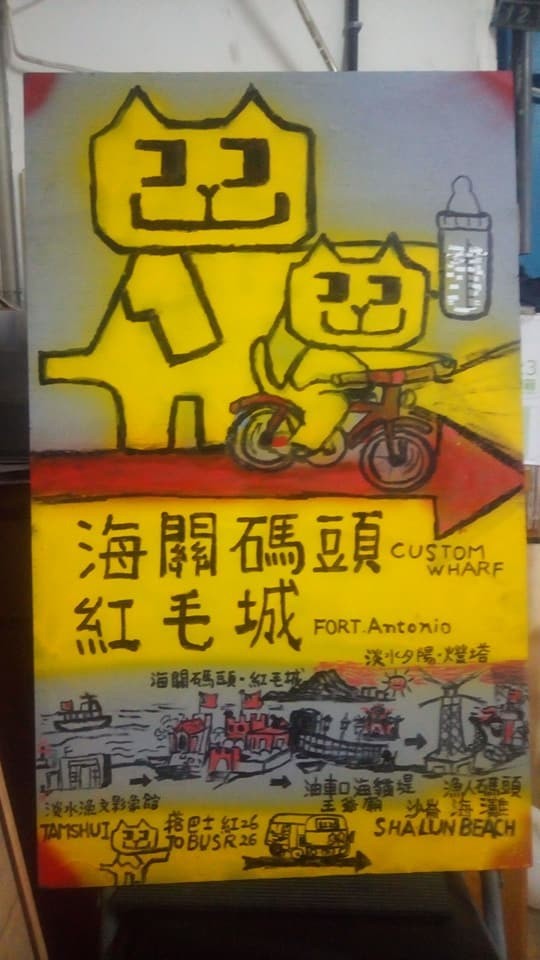

Mimi Meow (咪咪喵) is a character created by Lin Rongsheng, the owner of a gas station in Tamsui. After noticing how many trucks traveling to and from Tamsui would get into traffic accidents at busy intersections, Rongsheng started to paint Mimi Meow on streetlights and walls, hoping that it would cause drivers and pedestrians to pay more attention to their surroundings.
Local residents and students have joined in the creation by making Mimi Meow doppelgangers, highlighting dangerous areas and pointing tourists to Tamsui's local scenery and cultural features.
Image 1:
小心來車!- Be aware of incoming traffic!
Image 3:
勿入無燈地 - Don't enter unlit areas
慢跑 - Jog/walk slowly
結伴同行! - Go together!
以利呼救! - Call for help!
11 notes
·
View notes
Text
characteristics of the taiwanese accent
(台灣口音的特點)
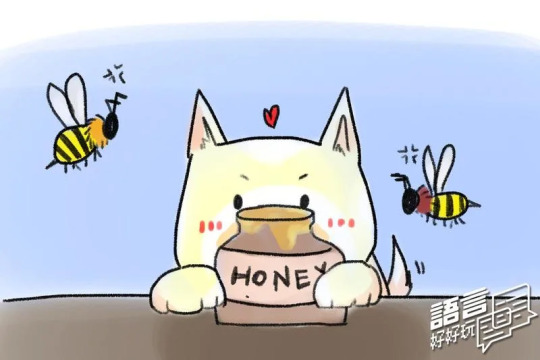
bit of a long one today, found an interesting article on the taiwanese accent written by 小熊 on zhihu and thought i'd translate some! (not a direct translation, pulled in some info from other sources & my own comments on it as well)
what is the taiwanese accent?
first, there's a distinction to be made between taiwanese mandarin and a taiwanese accent. taiwanese mandarin combines hokkien and japanese, has less “standard” pronunciation, and is most often used by the older generation; for example:
“你要不要氣高雄玩?” -- 去 [qù] -> 氣 [qì]
“素這樣子噢?” -- 是 [shì] -> 素 [sù]
“這就素台灣狗蟻啦” -- 口音 [kǒuyin] -> 狗蟻 [gǒuyǐ]
otoh, the taiwanese accent is the way of speaking that many find warm/sweet (many tv series will have at least One Female Character playing up this accent to act cute). the accent has the following characteristics:
(1) linking sounds (連音)
people will frequently combine two words into a single breath, like:
“真的假的” -> “zhenn假的”
“不要這樣子啦” -> “不要 jiàng子啦”
“那樣很討厭耶” -> "niàng很討厭耶"
(2) less obvious retroflex (不明顯的捲舌)
because hokkien does not have retroflex sounds, tw accent falls somewhere in the middle of curling and not curling the tongue, making “zh, ch, sh” (and r) sound like “z, c, s”:
“你要不要癡?” -- 吃 [chī] -> 疵 [cī]
“四不四!” -- 是 [shī] -> 四 [sī]
“额且啊⋯⋯” -- 而 [ér] -> 額 [é]
taiwanese do not use 兒化 (i.e. adding "兒” to the ends of words like 一點兒, 好玩兒)
(3) no distinction between “ang, eng, ing” and “an, en, in”
"這個婉路真的很難用耶" -- 網 [wǎng] -> 婉 [wǎn]
“蒸的啦,不是假的” -- 真 [zhēn] -> 蒸 [zhēng]
"幫我喂鯨魚” -- 金 [jin] -> 鯨 [jing]
---
difference in speaking styles
in addition to differences in pronunciation, there are also differences in speaking habits. in particular, taiwanese like to use:
(1) reduplication
people will commonly repeat words -- IKEA Taiwan memed this back in 2022 by putting up a bunch of posters with duplicated words to describe the items, since IKEA's chinese name uses duplicates too (宜家家居).
“這個包包真好看”
"要乖乖的快去睡覺覺噢”
(2) final particles (喔,啊, 啦, 嘛)
hokkien uses modal particles at the end of sentences much more frequently than mandarin, so the tw accent also adopts this way of speaking. mainlanders might find it to be overly emotional lol
"好冷”,“特別冷” -> "好冷噢~~”, “天啊~這麽這麽冷拉"
(3) raised and trailing sounds
while mainlanders tend to lower the ending sound of a sentence, taiwanese tend to make the last sound louder/longer
(4) please 請, thank you 謝謝, sorry 對不起, excuse me 不好意思
netizens, and even BBC Travel have noticed that taiwanese tend to apologize a lot with 不好意思, which i guess makes taiwan (+ japan) like the canada of the east...basically, politeness is very important!
the hokkien equivalent of this, which is also used very frequently, is 歹势 [pai sei], which you say twice in succession to mean sorry or ask for forgiveness (saying it only once means "unlucky"). you can hear it used at the beginning of eggplantegg's waves wandering.
(5) 和
和 is pronounced hàn in Taiwan, as opposed to hé
(6) huh? 蛤?
蛤? = huh? what did you say? hokkien equivalent = 什麼?[sah-mih]

[a 蛤蜊 is a clam]
#chinese#chinese language#chinese langblr#langblr#taiwanese#mandarin#studyblr#on god this took me way too long to write#i am a frequent 不要 jiàng子啦 user#tunastudies#if you see mistakes lmkkkkk
41 notes
·
View notes
Text
"Alright, time to see what this animated poetry movie is like-
Oh jesus christ"
36K notes
·
View notes
Text
新年词汇
大家好,新年快乐!
I've been seeing New Year's posts and sayings all over social media lately, so I just wanted to make a post collecting some of the phrases I've seen.
恭喜发财 gōng xǐ fā cái - may you have a prosperous New Year (财 indicating wealth and fortune)
恭贺新春/禧 gōng hè xīn chūn/xǐ - Happy New Year
龙年大吉 lóng nián dà jí - (wishing you) great luck (大吉) in the year of the dragon
身体健康 shēn tǐ jiàn kāng - (wishing you) health
万事兴隆/龙 wàn shì xīng lóng - may everything (万事) be prosperous (兴隆), with the pun that 隆 and 龙🐲 are homophones
龙/荣华富贵 lóng/róng huá fù guì - (wishing you) glory (荣华) and wealth (富贵), again playing with the similarities between 龙🐲 and 荣
龙凤呈祥 lóng chèng chéng xiáng - the dragon and the phoenix will bring luck
梦想成真 mèng xiǎng chéng zhēn - (may your) dreams come true
龙行龘龘 lóng xíng dá dá - (may you) fly like a dragon (i.e., upwards and full of energy)
3x 龍(龙) indicates the appearance of the flight of a dragon
生活䲜䲜 shēng huó yè yè - (may your) life be full of fish
4x 魚 (鱼) indicates abundance, prosperity
前程朤朤 qián chéng lǎng lǎng - (may) the road ahead be shining and splendid
4x 月 indicates brightness, shining
(for more discussion on the unique characters in these last three, see this post on Zhihu)
Hope everyone has a great Spring Festival and a Happy New Year!
春节快乐!
45 notes
·
View notes
Text
A Queshan struck iron firework (打铁花; da2tie3hua1) performance to welcome the Year of the Dragon. Queshan struck iron fireworks differ from other iron fireworks due to the two-layered pergola and space required. This particular performance also features dragon dancing.
Please see my post here (my pinned post) for the full journey of how OP learned to strike iron fireworks as well as some other information and details about the art. (This is the video OP is referring to at the beginning of the video.)
*Before the countdown, OP is quoting the poem 青玉案·元夕 by 辛弃疾.
[eng by me + edited an ad out]
849 notes
·
View notes
Text
she’s also the person who made the gigantic ice dragon sculpture o___o


打鐵花 (da2tie3hua1; struck iron fireworks) is a traditional folk firework that began in Henan and Shanxi, first arising in Queshan county, Henan and later circulating through the whole country. It had first appeared during the Northern Song dynasty, and was most popular during the Ming and Qing dynasties.
For Queshan struck iron fireworks, a two-layer pergola is built and covered with willow branches for performances, under which the molten iron is struck up with two willow sticks to create a rain of fire.
[eng by me + edited an ad out]
(On top of the information in the video, I have some more about its recent history under the cut.)
*Also, a note about one of the subtitles: I realized later that "going into battle without a shield" actually just meant going shirtless. I was only confused about this phrasing while translating because she didn't go shirtless, although that is for obvious reasons
Queshan struck iron fireworks had almost been lost before Yang Jianjun unearthed it again in 1988. It had almost died out in the early years of the Republic of China being established, after which there had only been three performances until 1988: 1952, 1956, 1962. Yang Jianjun had seen the 1956 performance as a 7-8 year old and later on as the director of a cultural centre, began digging up the skill and its history. In the process, he became an apprentice to Li Wanfa, who had been the last head of the Queshan Struck Iron Fireworks Society. He practised with sand and water, learning of its historical origin, its ancestral inheritors, craftsmanship and performance arts, but didn't touch the real thing until 1988. Through Yang Jianjun's efforts and investment, the first struck iron fireworks performance in more than 25 years took place in Nanshan Square (then a deserted area) in Queshan county.
Queshan struck iron fireworks are different from other struck iron fireworks in that it requires a wide area to perform, whereas others only needed a wall or could be hit straight up into the air, and it costs much more money to set up.
The names of inheritors are difficult to trace, and can only be traced back to the Qing dynasty during the Qianlong period, making Yang Jianjun a sixth-generation inheritor, and Jiang Xunqian (OP) the first woman and a seventh-generation inheritor.
#amazing work op on translation and culture context long video#my friend just sent me her profile on xhs#Why is she so cracked
8K notes
·
View notes
Text

河國榮 Gregory Charles Rivers
(30 April 1965 — 2 February 2024)
Posted this on my Insta Stories a couple days back but decided I'd do a post here too because I realised I'm still feeling saddened by Mr Rivers's passing.
For people of certain older generations, especially those who grew up in the 1990s watching Hong Kong TVB series, Mr Rivers, aka 河國榮 (Ho Kwok-Wing) to HK TV viewers, was an easily recognisable and familiar face, having been (at that time) the only foreign/Caucasian face to appear consistently in HK television armed with an impressive fluency in Cantonese.
I guess his passing has affected me more than I thought it would because firstly, I'd admired him for his proficiency in Cantonese and subconsciously looked to him as an inspiration.
As someone who grew up being terrible at Chinese (both Cantonese and Mandarin) and got teased for being “the banana” (i.e. yellow on the outside but white on the inside), the constant presence of this Caucasian guy on TV who could speak better Cantonese than I, partly spurred me on to learn Cantonese better myself.
Secondly, he represented an age when HK and by proxy, Cantonese, was flourishing; Mr Rivers's story of coming to Hong Kong purely motivated by his love for Cantopop and the Cantonese language is (sadly) not the kind of story one will hear very often again…with his passing, it's like yet another bit of the shine of “Golden Age” HK being taken away…and this “Golden Age” was part of my childhood, so it means another part of my childhood is gone…
Anyway, I'll end this post with this video of an interview Mr Rivers did (c. 2007) sharing his thoughts on his experiences as a foreign actor in HK.
河生,對於學緊廣東話嘅我嚟講,
您畀咗我唔少不知嘅鼓舞。
呢一點,我會喺心裏永遠默默感激。
希望您而家搵到了安寧,同妻子一路走好!
16 notes
·
View notes
Text
小红书 Vocab
小红书 (also referred to as xiaohongshu or XHS) is a Chinese image-based social media platform. It is a combination of the feed, likes, shopping, and video aspects of instagram, with the ~aesthetics~ and majority female audience of pintrest. I've grown really fond of it and found that it's algorithm is better than instagram and MUCH better than pintrest with giving me content I enjoy.
I'm going to offer some vocab that is either unique to the platform, or slang that is found on the platform (esp in bullet comments). I don't want this to be too long, so some terms may be omitted if they are found on many other social media apps
APP
小红书: Literally "Little Red Book". Probably a play off of Chairman Mao's book of speeches and writings which is also referred to as the Little Red Book. The app is not at all political, but more so trying to evoke the "essentiality" and "knowledge" aspect of the term.
笔记: Notes. XHS's name for its posts
收藏: Favorites. Separate from likes, these are bookmarked collections. This and Likes can be hidden
赞过: Likes. Notes that you "heart" will appear here.
关注: Notes from people you follow
发现: Discovery tab
附近: Recent notes
CONTENT
直播: Live-Streams
美甲: Nail Art
穿搭: Style
美食: Food
发型: Hairstyling
头像: Avatars/Profile Pictures
动漫: Animation and Comics
彩妆: Makeup
壁纸: Wallpapers
绘画: Drawing/Art
护肤: Skincare
影视: Film/TV
游行: Travel
减肥: Weight Loss
家居: Home
家装: Interior Design
学习: Studying
读书: Reading
情感: Romance
攝影: Photography
手工: Crafts
文化: Culture
游戏: Video Games
音乐: Music
舞蹈: Dance
搞笑: Comedy
明星: Stars
文具手: Stationary
校园生活: School Life
心里: Psychology
科学科普: Science
艺术: Art
社科: Social Sciences
萌龙: Cute
综艺: Variety
箱包: Handbags
潮鞋: Sneakers
健体塑型: Bodybuilding
职场: Office
婚礼: Wedding
汽车: Automobiles
潮玩手办: Collectable Figures
母婴: Parenting
机车: Motorbikes
户外: Outdoors
运动: Sports
露营: Camping
COMMENTS
(Things you'll see in tags/descriptions/bullet comments)
PLOG: Picture blog. Usually like a blog, but with photos/photo collage (also sometimes vlogs get this tag even though they're videos)
爱自己的100种方式: Originally from a feature on Douyin that would give a "treat yourself" style prompt if you comment this phrase
泰酷辣: Cool. Took off from this meme. “太酷啦”
上岸: Similar to "Goals". Usually posted to applaud an achievement/amazing life experience
巨: Super. Usually used in describing really tasty food “巨巨巨好吃”
cos: Cosplay
emo: The original meaning—emotional. More often used to mean a depressed mood than the style/subculture
磕: to ship a couple (cp)
For the Lesbians
t: Tomboy/masc lesbian (Sub-types include 铁t,奶t,娘t, 爷t, 长发t, 短发t)
p: Femme lesbian (p said to come from "Pretty girl" or “婆”)
h: neither femme nor masc/futch
le/les/啦啦: Lesbian
双女主: F/F couple (IRL or in fiction)
淘淘乐/TTL:T/T relationship
泡泡龙/PPL: P/P relationship
黄鹤楼HI: H/H relationship
TPL: T/P relationship
🐟: Ultra passive bottoms
140 notes
·
View notes
Text
大草原不可避 : Keyboard smashing in Japanese
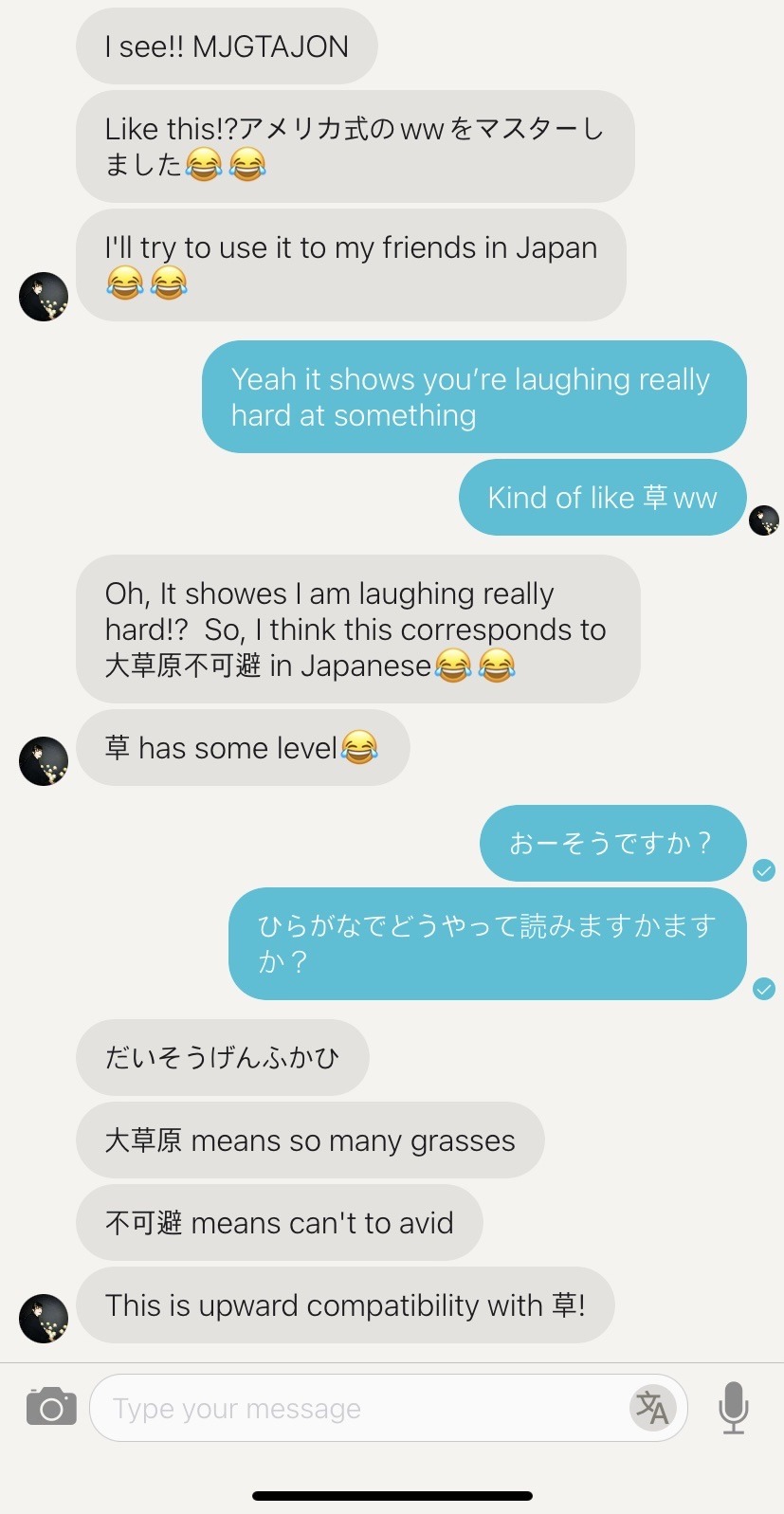
I explained how keyboard smashing in English expresses laughing really hard and she taught me the Japanese equivalent in return!!
As some of you might know, in Japanese, “w” from the word “to laugh” 笑う 「わらう」 is basically like “lol” in Japanese so when there’s a bunch of “w”’s together it looks like this wwwwwwwwwwwwwwwwwwwwww
and it looks like a bunch of grass so one slang word to show something is funny is 草 「くさ」 which is the word/kanji for grass so you don’t have to type out a bunch of w’s.
So the step up from 草 is 大草原 「だいそうげん」 which means prairie since there’s a lot more grass.
And if something leaves you laughing so much that you can’t hold it back you could say 大草原不可避 「だいそうげんふかひ」 which basically means “inevitable prairie”.
The “inevitable part”, 不可避 「ふかひ」 in this phrase means laughter is inevitable and you can’t help but laugh.
37K notes
·
View notes
Text
Douyin's learned a new word it seems, because every video has the word "submission" being spammed underneath. Apparently there was an English exam the other day with the word in one of the prompts, and a ton of people didn't know what it meant.
What's funny is I swiped across a guy attempting to explain the word by connecting it to other words, except he assumed the viewer knew what the English words "dom" and "sub" meant, so got these types of comments lmao:
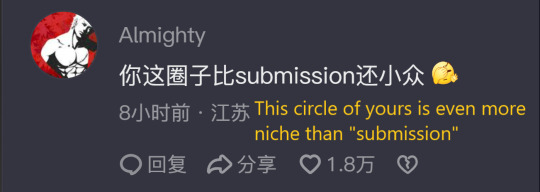
Why would he assume this, where are people using the English words "dom" and "sub"? Like I have seen people sub English for Chinese terms before, except it's like "BDSM", or using "S"/"M" to mean sadist/masochist (sometimes obfuscating it further by replacing them with terms like 星巴克/麥當勞 (Starbucks/Mcdonalds) or clothing size small/medium) where I'm pretty sure people don't really know what they stand for in English, just what they mean? Where is this guy hanging out lmao
61 notes
·
View notes
Text
Exploring Chinese names of Taiwan

A while ago, I stumbled across this press release for Taiwan's National Names Statistical Analysis report. Then I clicked on the full report and spent days glued to my screen reading it!
So, courtesy of Taiwan's Ministry of the Interior, let's look at some of the data. We will look at: top given names, top full names, and top unisex names.
Format:
陈淑芬 | 陳淑芬 Chén Shūfēn | Chén Shúfēn / 3747人
简体 | 繁體 读音 | 台湾读音 / 人数
(Simp.) | (trad.) (pronunciation) | (Taiwan pronunciation) / (# people)
I put simplified first for consistency with the rest of my blog. 简体 | 繁體 is the convention I use in many other posts.
Top 10 given names (by decade)
The report shows the top names by decade, which is really fascinating because you can see how tastes and trends changed over time. I'm just going to show the overall top 10 and last three full decades (1990s, 2000s, and 2010s) but you can see the rest on pg. 280 of the report (pg. 281 of the PDF).
Male

Overall
家豪 Jiāháo / 14,038人
志明 Zhìmíng / 12,719人
建宏 Jiànhóng / 12,196人
俊杰 | 俊傑 Jùnjié / 12,187人
俊宏 Jùnhóng / 11,189人
志豪 Zhìháo / 10,676人
志伟 | 志偉 Zhìwěi / 10,563人
承翰 Chénghàn / 9726人
冠宇 Guànyǔ / 9655人
志强 | 志強 Zhìqiáng / 9101人
1991-2000
家豪 Jiāháo / 4039人
冠宇 Guànyǔ / 3603人
冠廷 Guàntíng / 3399人
承翰 Chénghàn / 3008人
宗翰 Zōnghàn / 2831人
柏翰 Bóhàn / 2594人
彦廷 | 彥廷 Yàntíng / 2502人
冠霖 Guànlín / 2114人
俊杰 | 俊傑 Jùnjié / 2084人
承恩 Chéng’ēn / 1918人
2001-2010
承恩 Chéng’ēn / 2997人
承翰 Chénghàn / 2636人
冠廷 Guàntíng / 2452人
冠宇 Guànyǔ / 2206人
宇翔 Yǔxiáng / 1938人
柏翰 Bóhàn / 1885人
彦廷 | 彥廷 Yàntíng / 1610人
冠霖 Guànlín / 1509人
柏宇 Bóyǔ / 1471人
柏谚 | 柏諺 Bóyàn / 1409人
2011-2020
承恩 Chéng’ēn / 2215人
宥廷 Yòutíng / 2036人
品睿 Pǐnruì / 2021人
宸睿 Chénruì / 1904人
宇恩 Yǔ’ēn / 1860人
宇翔 Yǔxiáng / 1713人
承翰 Chénghàn / 1556人
宥辰 Yòuchén / 1532人
柏睿 Bóruì / 1511人
睿恩 Ruì’ēn / 1503人
Female
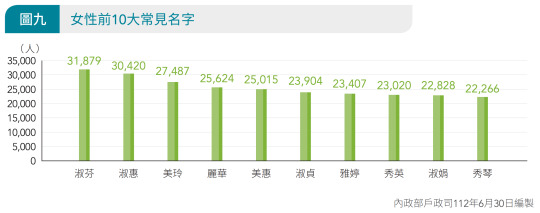
Overall
淑芬 Shūfēn | Shúfēn / 31,879人
淑惠 Shūhuì | Shúhuì / 30,420人
美玲 Měilíng / 27,487人
丽华 | 麗華 Lìhuá / 25,624人
美惠 Měihuì / 25,015人
淑贞 | 淑貞 Shūzhēn | Shúzhēn / 23,904人
雅婷 Yǎtíng / 23,407人
秀英 Xiùyīng / 23,020人
淑娟 Shūjuān | Shújuān / 22,828人
秀琴 Xiùqín / 22,266人
1991-2000
雅婷 Yǎtíng / 5797人
怡君 Yíjūn / 3575人
怡婷 Yítíng / 3183人
雅雯 Yǎwén / 3084人
诗涵 | 詩涵 Shīhán / 3006人
钰婷 | 鈺婷 Yùtíng / 2775人
怡萱 Yíxuān / 2729人
雅筑 Yǎzhù | Yǎzhú / 2700人
郁婷 Yùtíng / 2600人
宜庭 Yítíng / 2555人
2001-2010
宜蓁 Yízhēn / 2629人
欣妤 Xīnyú / 1643人
诗涵 | 詩涵 Shīhán / 1610人
思妤 Sīyú / 1561人
雅婷 Yǎtíng / 1439人
宜庭 Yítíng / 1394人
佳颖 | 佳穎 Jiāyǐng / 1375人
品妤 Pǐnyú / 1336人
子涵 Zǐhán / 1271人
怡萱 Yíxuān / 1258人
2011-2020
品妍 Pǐnyán/ 2421人
子晴 Zǐqíng / 2087人
咏晴 | 詠晴 Yǒngqíng / 2001人
品妤 Pǐnyú / 1697人
禹彤 Yǔtóng / 1578人
羽彤 Yǔtóng / 1434人
芯语 | 芯語 Xīnyǔ / 1342人
宥蓁 Yòuzhēn / 1226人
语彤 | 語彤 Yǔtóng / 1221人
苡晴 Yǐqíng / 1164人
Top 10 full names
In Mainland China the most common full names are usually something like 张伟 and 李娜. In Taiwan, 单名 (single-character given names) are much rarer, so the results are very different. We can also really see the dominance of the surname 陈 here. The rest of the top 100 are on pg. 268 of the report (pg. 269 of the PDF).
Male

陈冠宇 | 陳冠宇 Chén Guànyǔ / 4021人
陈建宏 | 陳建宏 Chén Jiànhóng / 3524人
张家豪 | 張家豪 Zhāng Jiāháo / 2890人
陈俊宏 | 陳俊宏 Chén Jùnhóng / 2801人
陈冠廷 | 陳冠廷 Chén Guàntíng / 2469人
陈柏宇 | 陳柏宇 Chén Bóyǔ / 2383人
林建�� Lín Jiànhóng / 2375人
陈柏翰 | 陳柏翰 Chén Bóhàn / 2353人
陈彦廷 | 陳彥廷 Chén Yàntíng / 2249人
陈信宏 | 陳信宏 Chén Xìnhóng / 2120人
Female

陈怡君 | 陳怡君 Chén Yíjūn / 5744人
林怡君 Lín Yíjūn / 4401人
陈淑芬 | 陳淑芬 Chén Shūfēn | Chén Shúfēn / 3747人
张雅婷 | 張雅婷 Zhāng Yǎtíng / 3491人
陈美玲 | 陳美玲 Chén Měilíng / 3235人
陈怡如 | 陳怡如 Chén Yírú / 3121人
陈美惠 | 陳美惠 Chén Měihuì / 3103人
陈淑惠 | 陳淑惠 Chén Shūhuì | Chén Shúhuì / 2921人
林淑惠 Lín Shūhuì | Lín Shúhuì / 2903人
陈淑贞 | 陳淑貞 Chén Shūzhēn | Chén Shúzhēn / 2751人
Unisex/gender-neutral names

Do you want a name that doesn't strongly lean towards masculine or feminine? The report also highlight the common names across genders. It seems their criteria for this was names falling between 40% male-60% female and 60% male-40% female.
To clarify, they actually looked at the top 100 full names, not given names. For instance, 宥均 Yòujūn was on the list three times with three different surnames. But I re-sorted the list by given name since I was curious to see that. You can find the original data on pg. 270 of the report (pg. 271 of the PDF).
宥均 Yòujūn
Total: 1804人
Male: 54.77%
Female: 45.23%
佳霖 Jiālín
Total: 1111人
Male: 51.67%
Female: 48.33%
家华 | 家華 Jiāhuá
Total: 923人
Male: 53.41%
Female: 46.59%
郁文 Yùwén
Total: 847人
Male: 43.68%
Female: 56.32%
禹安 Yǔ’ān
Total: 789人
Male: 51.71%
Female: 48.29%
以恩 Yǐ’ēn
Total: 730人
Male: 49.32%
Female: 50.68%
孟儒 Mèngrú
Total: 643人
Male: 55.05%
Female: 44.95%
冠桦 | 冠樺 Guànhuà
Total: 643人
Male: 52.26%
Female: 47.74%
靖恩 Jìng’ēn
Total: 621人
Male: 44.93%
Female: 55.07%
品辰 Pǐnchén
Total: 600人
Male: 58.83%
Female: 41.17%
Notes
The report is INCREDIBLY detailed. I'm not kidding. The body of the report is not that long, but it has a very long appendix with about 200 pages of tables. Here are some examples of data included that I didn't mention:
Most popular given names people changed their names to
Most common 单名 and 叠字名字
Most common last names by city/county
Indigenous peoples' use of the Latin alphabet for names
Prevalence of multi-character surnames
And so, so much more!
And FYI, the report uses the ROC calendar, which starts with the founding of the Republic of China. To convert from the ROC calendar to the Gregorian calendar, add 111.
Ex:
1年=1912
112年=2023
Pronunciation & tones
冠 is a 多音字 that is pronounced guān or guàn. I went with guàn because that seems to be more common in names from what I've observed.
柏 is also a 多音字 that can be pronounced bǎi or bó. MDBG says Taiwan doesn't have the bǎi pronunciation. I usually hear it read as bó in names, so that's what I'm going with.
MDBG also says 淑 is pronounced shú (not shū) in Taiwan. Likewise, it says 筑 is zhú (not zhù). I'll take their word for it.
I tried to put apostrophes in the right places (like for 承恩 Chéng’ēn), but I'm really bad at knowing when and where to use it. Please pardon any mistakes!
See similar posts:
Chinese surnames that are more common in Taiwan
A closer look at Chinese names
Analyzing Chinese names: Syllables & tones
The evolution of Chinese names (Kontinentalist)
75 notes
·
View notes
Text
Try to guess what “快把我发配宁古塔” could mean.
Context: I shared a story on Weibo about how I experience -17 degree for the first time in Sweden and some people commented the following:

I wasn’t expecting these comments to say the least. To me the 🥵 was hinting as some sexual underlying meaning.
But I couldn’t be more wrong haha.
Turns out, it’s a reference to a 2011 series called 后宫甄嬛传 (hòugōng zhēn huánchuán). It is (according to my friend) the most famous Chinese series about Qing dynasty.
And in this story, if someone commits a crime of offend the emperor they could be sentenced to go to a place called 宁古塔, which is very very cold (like Sweden)
So these comments were asking to be exiled to 宁古塔 simply meaning that they would want to go to a cold place like Sweden haha.

So know you know what this reference means 嘻嘻
快kuài 把bǎ 我wǒ 发配fāpèi 宁古塔níng gǔtǎ
Here’s a 知乎 article about 宁古塔 during Qing dynasty
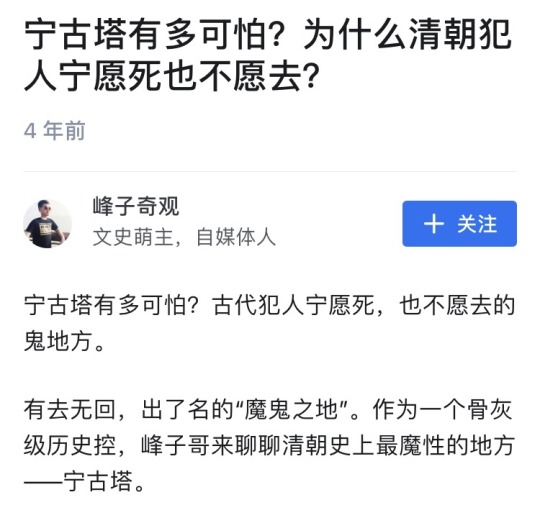
34 notes
·
View notes
Text
@don-dake 就是這個卯!!我剛剛想,記得你貼了跟這詞有關的post
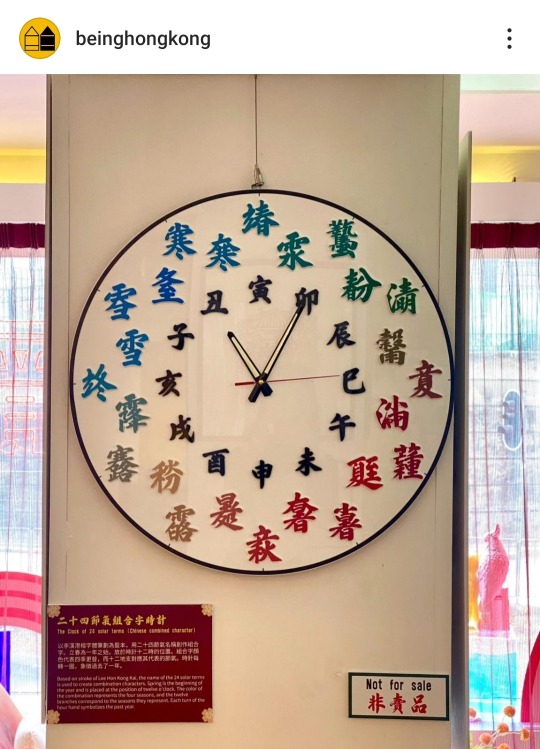
[Insta: beinghongkong]
Saw this on Instagram earlier, thought what a strange coincidence it was when I was just thinking about the Ancient Chinese time-keeping method (see “子, 丑, 寅, 卯” link below) not too long ago! Gonna translate the other characters just for fun! Also as a future ref. for myself.
「二十四節氣組合宇時計」
“The Clock of 24 Solar Terms”
立春、雨水、驚蟄、春分、清明、穀雨。
🇭🇰🇲🇴 laap⁶ ceon¹, jyu⁵ seoi², ging¹ zat⁶, ceon¹ fan¹, cing¹ ming⁴, guk¹ jyu⁵
🀄 ㄌㄧˋㄔㄨㄣ,ㄩˇㄕㄨㄟˇ,ㄐㄧㄥㄓㄜˊ,ㄔㄨㄣㄈㄣ,ㄑㄧㄥㄇㄧㄥˊ,ㄍㄨˇㄩˇ
🀄 lì chūn,yǚ shuǐ,jīng zhé,chūn fēn,qīng míng,gǔ yǚ
立夏、小滿、芒種、夏至、小暑、大暑。
🇭🇰🇲🇴 laap⁶ haa⁶, siu² mun⁵, mong⁴ zung³, haa⁶ zi³, siu² syu², daai⁶ syu²
🀄 ㄌㄧˋㄒㄧㄚˋ,ㄒㄧㄠˇㄇㄢˇ,ㄇㄤˊㄓㄨㄥˋ,ㄒㄧㄚˋㄓˋ,ㄒㄧㄠˇㄕㄨˇ,ㄉㄚˋㄕㄨˇ
🀄 lì xià,xiǎo mǎn,máng zhòng,xià zhì,xiǎo shǔ,dà shǔ
立秋、處暑、白露、秋分、寒露、霜降。
🇭🇰🇲🇴 laap⁶ cau¹, cyu² syu², baak⁶ lou⁶, cau¹ fan¹, hon⁴ lou⁶, soeng¹ gong³
🀄 ㄌㄧˋㄑㄧㄡ,ㄔㄨˇㄕㄨˇ,ㄅㄞˊㄌㄨˋ,ㄑㄧㄡㄈㄣ,ㄏㄢˊㄌㄨˋ,ㄕㄨㄤㄐㄧㄤˋ
🀄 lì qīu,chǔ shǔ,bái lù,qīu fēn,hán lù,shuāng jiàng
立冬、小雪、大雪、冬至、小寒、大寒。
🇭🇰🇲🇴 laap⁶ dung¹, siu² syut³, daai⁶ syut³, dung¹ zi³, siu² hon⁴, daai⁶ hon⁴
🀄ㄌㄧˋㄉㄨㄤ,ㄒㄧㄠˇㄒㄩㄝˇ,ㄉㄚˋㄒㄩㄝˇ,ㄉㄨㄤㄓˋ,ㄒㄧㄠˇㄏㄢˊ,ㄉㄚˋㄏㄢˊ
🀄 lì dōng,xiǎo xüě,dà xüě,dōng zhì,xiǎo hán,dà hán
And, some may be wondering (as I did initially) why 「寅」 appears to be mapped to 12 o'clock (the first position) in the clock in the first pic, instead of 「子」 as is usually the case, the reason is that that clock emphasises the Solar Term calculations.
Basically, something about calculating the sun's ecliptic longitude, and 「立春」 (Start of Spring) happens to correspond to 「寅」 (the Tiger Zodiac) rather than 「子」 (the Rat Zodiac). It's quite a complicated thing and I'm not knowledgeable enough to expound on it further. Please read up more on “Solar Term” (Wiki link given above) if interested!
If we are just talking about a 24-hour time frame according to a Gregorian time-keeping system, and someone wants to map an Ancient Chinese time-keeping format to the modern clock, then starting with 「子」 is (usually) the way to go.
子、丑、寅、卯、
辰、巳、午、未、
申、酉、戌、亥
Glad to say I'm finally reciting the order of Ancient Chinese time-keeping correctly! Guess seeing cartoon Zodiac animals did help! 哈!(see above link for ref.)
Here's a pic showing an example of another analog clock with 「子、丑、寅、卯…etc.」 replacing the usual numbers:
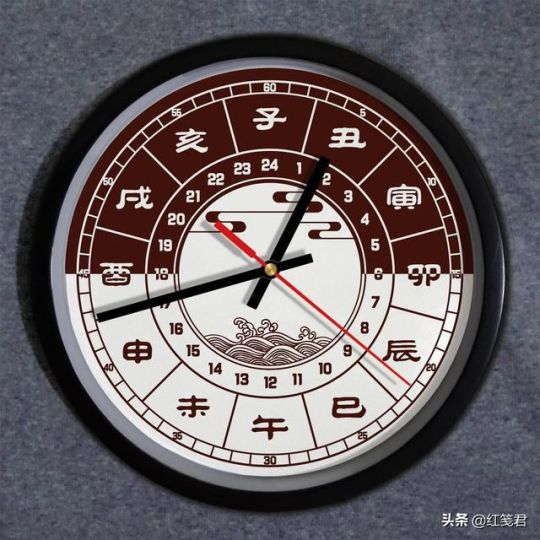
#re: the usage of 卯起來#if you hadn't asked i literally would have never made the connection#or questioned what 卯 means bc i have literally only ever heard it used in the context of 卯起來 lmaoaoao
23 notes
·
View notes
Text
Random 🇭🇰🇲🇴 Cantonese Phrase-of-the-day (a *歇後語):
* 歇後語 (🇭🇰🇲🇴 hit³ hau⁶ jyu⁵,🀄 ㄒㄧㄝㄏㄡˋㄩˇ/xiē hòu yǚ)
Per Wikipedia: “Is a kind of Chinese proverb consisting of two elements: the former segment presents a novel scenario while the latter provides the rationale thereof. One would often only state the first part, expecting the listener to know the second. Compare English "an apple a day (keeps the doctor away)" or "speak of the devil (and he doth/shall appear)".”
牛皮燈籠 (點極都唔明)
ngau⁴ pei⁴ dang¹ lung⁴ (dim² gik⁶ dou¹ m⁴ ming⁴)
Meaning: a stubborn (and/or stupid) person who can't (seem to) understand and follow what others tell them.
Literal meaning:
牛皮燈籠 — Cow/Ox/Bovine 🐂 skin (i.e. leather) Lantern 🏮
點極都唔明 — no matter how you try to light it, it cannot be bright
(n.b.: 明 — “bright”, has another meaning of “to understand”)
Thinking about bovines 🐂 and leather just made me think of Appa in (leather) amour. Please enjoy this thing I slapped together as an example on how to use the phrase 「牛皮燈籠」:

Momo: 你正一隻牛皮燈籠嚟㗎!點極都唔明!
nei⁵ zing³ jat¹ zek³ ngau⁴ pei⁴ dang¹ lung⁴ lei⁴ gaa³! dim² gik⁶ dou¹ m⁴ ming⁴!
You really are a stubborn cow (fig. & lit.)! You just don't get it!
Appa: 唔明?!𨳒你仆街冚家剷!你好快就會明乜係叫 「因住你嘅 『八月十五』 『亮』 起嚟呀」 !
m⁴ ming⁴?! diu² nei⁵ puk¹ gaai¹ ham⁶ gaa¹ caan²! nei⁵ hou² faai³ zau⁶ wui⁶ ming⁴ mat¹ hai⁶ giu³ 「jan¹ zyu⁶ nei⁵ ge³ 『baat³ jyut⁶ sap⁶ ng⁵』 『loeng⁶』 hei² lei⁴ aa³」 !
(I) don't get it?! Fu*k you bastard and your entire clan! You'll soon get what it means ‘when your “full moon” is “lit” up’!
(n.b.: 八月十五 — lit. 15th day of the 8th Lunar month, is the day when (it's believed) the moon 🌕 shines the brightest, so saying 八月十五 usually refers to “a full moon”. But it can also be a euphemism for “butt”)
*********************************
仲否認自己唔係…牛皮燈籠 (點極都唔明) ?
zung⁶ fau² jing⁶ zi⁶ gei² m⁴ hai⁶ ngau⁴ pei⁴ dang¹ lung⁴ (dim² dou¹ m⁴ ming⁴) ?
And you're still denying you're not…a stubborn cow?
4 notes
·
View notes